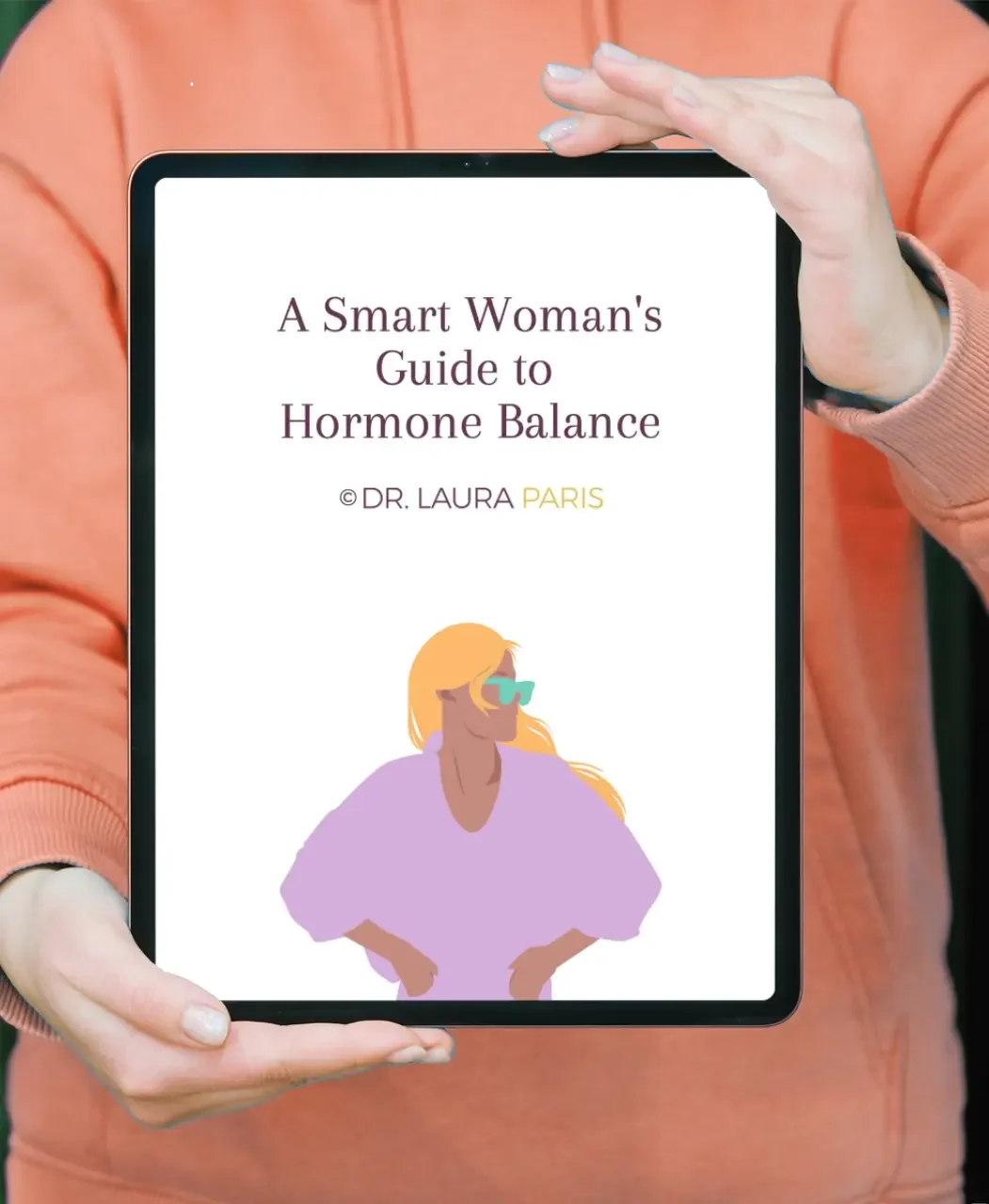
Are you ready to take charge of your health?I help women achieve vibrant health through all phases of life with a personalized, holistic approach.
SIGN UP FOR MY NEWSLETTER AND GET YOUR FREE GIFT:
A SMART WOMAN'S GUIDE TO HORMONE BALANCE

SIGN UP FOR MY NEWSLETTER AND GET YOUR FREE GIFT:
A SMART WOMAN'S GUIDE TO HORMONE BALANCE

Thyroid and reproductive hormones are deeply connected. Your thyroid hormones influence your menstrual cycle’s timing, flow, and your ability to conceive. In this post, we’ll explore how hypothyroidism affects your cycle and fertility. Whether you’re trying to conceive or experiencing irregular periods, understanding this connection can help.
Thyroid hormones play a key role in follicle development. Your ovaries and the eggs (oocytes) in your follicles have numerous thyroid hormone receptors. If you’re hypothyroid, your follicles may not develop properly due to insufficient thyroid hormone levels, leading to:
A healthy balance of thyroid hormones is crucial for ovulation and a regular menstrual cycle.
Over half of women with hypothyroidism experience menstrual irregularities. Here are the most common issues caused by low thyroid hormones:
To learn more about our approach to hypothyroidism, check out Functional Medicine Approach to Hypothyroidism: A Guide for Women.
Hypothyroidism can also lead to imbalances in other hormones, particularly:
Many women with hypothyroidism experience low progesterone and high estrogen, often seen in conditions like PCOS, fibroids, and endometriosis. High estrogen can occur due to:
Symptoms of estrogen dominance include breast tenderness, mood swings, bloating, PMS, and heavy periods.
Hypothyroidism often elevates prolactin, the hormone responsible for breast development and milk production during pregnancy. Elevated prolactin can interfere with follicle development by lowering follicle-stimulating hormone (FSH), which can lead to missed periods (amenorrhea).
Thyroid dysfunction can also impact puberty. In adolescent girls, low thyroid hormones may delay puberty, or, conversely, cause early menstruation due to premature follicle stimulation.
Hypothyroidism can complicate conception for several reasons:
Studies show that women with a thyroid-stimulating hormone (TSH) level under 2.5 are more likely to conceive. The good news is that treatment for hypothyroidism can lower prolactin levels, restore balance, and improve fertility outcomes. To learn more about hypothyroidism during pregnancy, read Hypothyroid in Pregnancy: The Key to a Healthy Baby and Mother.
Optimizing your thyroid health is key to achieving a healthy menstrual cycle and improving your chances of conception. Reach out for personalized support with your thyroid health.
Have questions? Drop them below!

Dr. Laura Paris is a women’s health specialist who provides Acupuncture and Functional Medicine care at her two clinics in Capitola and Monterey, California. She also works with women remotely in the United States through telehealth appointments. Learn more about Laura here, and message her directly here.
Click the button to talk to Dr Laura on a 20-minute discovery phone call ($67)
Dear Laura,
I can’t thank you enough for sharing this important lesson about hypothyroidism. It’s intriguing how the reactions happens inside our bodies resulting into fascinating experiences related to periods, fertility and even conception. About the stunting of the follicle, missed, infrequent or extra-heavy periods is whether there is any known cure for them. If yes, are there any restrictions? I think that may be so instrumental in answering some mind-boggling queries in some readers of this wonderful piece.
Best Regards,
Julia Morales.
Hi Julia,
Thank you for reading! I’m not sure what you mean by restrictions… But yes, there’s lots of ways to approach hypothyroidism, whether it’s autoimmune or not. I write more about that beginning here: https://www.parishealingarts.com/hypothyroid-symptoms-diagnosis-functional-medicine/
Best,
Laura
Tengo sindrom ovary polistico llevo 5 anos tratando para tener un baby nada De nada
Lamento que no hayas tenido éxito! Espero que estes.
Hello my name is merry and I just asked my RE about Hypothyroidism and can it make your FSH level high and she told me no it has nothing to do with FSH and POF now im confused?
Hypothyroidism won’t directly raise FSH, true. However, they can both have the same root cause.
-Laura
Is there anything nutritionally/supplement etc. That can treat hypothyroid, low progesterone and slightly high LSH. All my other labs are normal.
I have a whole post on thyroid nutrition here: https://www.parishealingarts.com/hypothyroid-nutrition/
Vitex can support progesterone for some, it takes a few months.
LSH? You may mean FSH. Would need more detail and an appointment to advise on this.
Good luck!
Hi there,
When is the optimal time to get TSH tested during a cycle if not on any ovarian stimulation meds and no history of PCOS?
TSH can be tested anytime!
Hi Laura,
I have hypothyroidism and my FSH is high, though my LH is normal (TSH, FSH and LH were all taken on day 5). I have very irregular cycles which are most often 40+days apart. I am 43 years old and wonder if this means I am in late stage perimenopause.
Thank you,
Mary.
Perimenopause generally includes all women in their 40s who are still cycling. So yes!
Hi Laura,
I’ve recently been diagnosed with hypothryoidism post partum (the pregnancy ended in still birth-Ive been assured the hypothyroidism had nothing to do with losing our child) I have now started levo treatment (it’s been 11 days).
I track my periods as me and my husband wish TTC again (this is now on hold due to the recent diagnosis). My periods have always been irregular tbh, but since pregnancy theyve range from 25-34 days long, and my luteal phases are short between 8-10 days. Now I am on levo is it likely my luteal phase will become longer?
From tracking my temps and LH/opk, I know I am having the LH peak (at 16 days and at 22 days), and I appear to be ovulating with a shift in higher temps and CM.
However, during the luteal phase, I feel my progesterone levels arent being maintained long enough, as my temp raises, remains elevated and then I see a sudden temp drop and AF shows up like clock work when this happens..
Just hoping Levo is the answer.